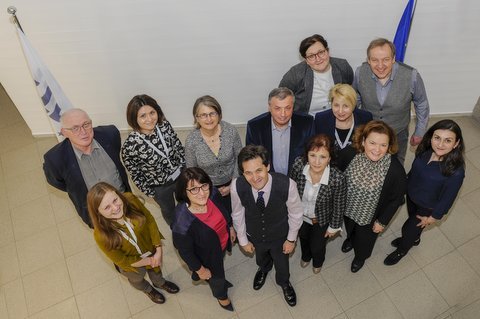
Moldova: Modernising qualifications
Modernising education is a priority in Moldova, with a focus on curricular reform and a new National Qualifications Framework (NQF). The new law to establish a NQF was adopted in late 2017. To help take implementation forward, high-level officials overseeing different departments in the Ministry of Education, Culture and Research joined ETF experts for a three-day training in Turin, 10-12 April.
A broad range of topics were covered including qualification standards, the learning-outcome approach, the European Qualifications Framework (EQF), recognising foreign diplomas, validating non-formal and informal learning and sectoral committees.
Tatiana Gherstega leads the recently established NQF Department, which is tasked with developing the national qualifications framework in collaboration with social partners and other stakeholders. ‘The ETF has supported us from day 1! For example with the drafting of the legislation,' she says.
‘We have since approved the qualifications methodology and internal regulations for the functioning of the department, and we are now working on the concept of a national register for qualifications. We have had the expertise, opinions and consultancy of the ETF experts on all these issues along the way!’
Moldova is working to align its NQF with the EQF, the EU’s translation device to help make national qualifications more readable across borders. ‘The NQF and the EQF are perfectly compatible,' Tatiana says. ‘And we want to take the following two years to demonstrate this.’
Cristina Denita-Boto oversees the Lifelong Learning Department. ‘The NQF must provide qualifications achieved through non-formal and informal learning, and this is where we come in,’ she explains. ‘Because we have lacked a national approach, we didn’t have this type of opportunity to offer to the workers in the country. In particular, this development will help people who didn’t have the chance to go to school and those who worked abroad to certificate their competences to go for a new job and a new start. The NQF will help us to provide better public services overall for people who really need it.’
Setting up Sectoral Councils was another topic covered during the three-day learning workshop. Led by employers, business associations, trade unions and other social partners, the councils are gathering sector-specific labour market information to better anticipate and address skills mismatch. Work has begun on the agriculture, food, IT and communication, transport and trade sectors. The EU has been supporting the development of the councils through the framework of Budget Support (€25 million, ending 2017) as well as the qualifications reform.
Vera Erhan leads the Institutional Management Department, which advises the ministry on financial issues. While not directly involved in the NQF development she says the training has been very useful. ‘I am sure that I can use the information, good practices and practical exercises in my work, including cross-collaboration with other departments to further develop policy.’
Tatiana Gherstega concurred saying the large and diverse amount of information has been ‘somewhat mind-blowing.’ ‘Everything we have heard is extremely important for our activities. This training has allowed us to better understand obstacles we have already encountered and to think of possible solutions to solve them!’
ETF expert Carmo Gomes said it was a pleasure to host the highly committed group working intensively through the comprehensive programme. ‘This is with any doubt a rewarding experience and a good example of how the ETF is working together with its partner countries.’
Next Steps
Possible peer-learning and knowledge-sharing from neighbouring countries Ukraine and Georgia, which are facing similar implementation challenges. TAIEX, the European Commission’s Technical Assistance and Information Exchange instrument, can be mobilised for this exchange.
Did you like this article? If you would like to be notified when new content like this is published, subscribe to receive our email alerts.